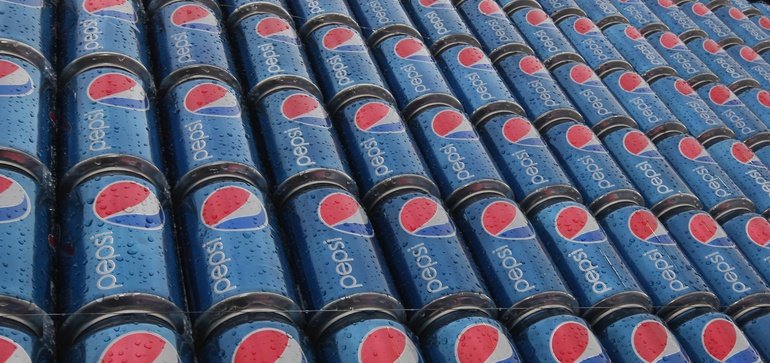PepsiCo pursues trademark for Rockstar-branded beer and hard seltzer, Bloomberg reports

Dive Brief:
- PepsiCo has filed a trademark application that shows the beverage and snack giant could eventually decide to sell alcoholic beverages under the Rockstar brand name, Bloomberg reported.
- The news service said PepsiCo wants to register the name for beer, alcoholic fruit cocktail drinks, alcoholic malt beverages and hard seltzer. The application was filed under a provision that said PepsiCo plans to use the trademark for alcoholic beverages but has yet to do it.
- A move into alcohol would mirror a push recently by Coca-Cola, which inked a deal for Molson Coors to manufacture, market and distribute a hard seltzer version of its Topo Chico sparkling water.
Dive Insight:
While alcoholic offerings from PepsiCo don’t appear imminent, the maker of Aquafina water, Tropicana orange juice and its namesake cola has given hints in the past that it is seriously considering the category.
Last October, CEO Ramon Laguarta told analysts the company would “make the decisions in the coming quarters, whether this is an area where PepsiCo wants to play.” And earlier this year, PepsiCo introduced a brand of nonalcoholic cocktail mixers called Neon Zebra in four flavors: Margarita Mix, Strawberry Daiquiri Mix, Mojito Mix and Whiskey Sour Mix. The drinks are designed to appeal to younger consumers spending more time at home who want to avoid complicated cocktail recipes or large-format mixers.
While it’s uncertain which alcoholic beverages PepsiCo would enter, it’s likely to dabble in one or two first to get its feel for the category before deciding whether to roll out additional offerings.
Much like Coca-Cola used Topo Chico as the base for its hard seltzer, the patent application indicates PepsiCo is looking to do much the same thing with Rockstar. PepsiCo spent $3.85 billion in 2020 to acquire the struggling energy drink in an effort to accelerate its push into functional beverages. Hard seltzer would be a logical extension for an energy drink like Rockstar.
If PepsiCo does enter alcohol through the Rockstar banner, it would allow it to tap into a brand with instant recognition. It also would allow PepsiCo to increase the number of consumers who use the brand by entering additional beverage categories and maximizing the multibillion-dollar price it paid to purchase it.
PepsiCo would most likely want to partner with another company that has experience making, marketing and navigating the complex legal rules and distribution systems in place for alcoholic beverages. Coca-Cola, which has spent decades working with sodas, waters, teas and sports drinks, likely partnered with Molson Coors for this reason.
PepsiCo, even if it enters alcohol slowly at first, would probably need to partner with a larger company like AB InBev’s Anheuser–Busch or Heineken given its expansive reach.
Laguarta said last year that a big factor in its decision “is who do we play with and who do we partner to maximize the value for PepsiCo?”
PepsiCo has been actively expanding its beverage portfolio in an effort to give consumers moving away from sugar more choice and increase the company’s ability to grab more of the occasions throughout the day when they might turn to a drink.
It launched sparkling water Bubly and spent $3.2 billion to purchase sparkling water maker SodaStream. PepsiCo also acquired plant-based Evolve and Muscle Milk shakes from Hormel Foods. In addition, PepsiCo introduced Soulboost, an enhanced sparkling water beverage made with real juice and functional ingredients; Driftwell for relaxation and decreasing stress; and a line of juice waters called Frutly aimed at teens.
As people relax and unwind at the end of the day, they may want to reach for an alcoholic drink, or one of these beverages, rather than a soda or juice. A move into alcohol would be a logical and smart step for a company that knows what the beverage consumer wants as much as anyone.
Source: fooddive.com

